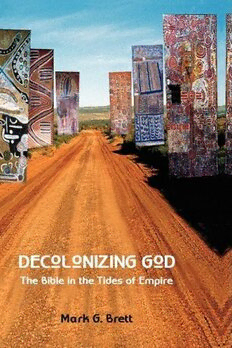
Decolonizing God: The Bible in the Tides of Empire (The Bible in the Modern World) PDF
248 Pages·2008·0.823 MB·English
Most books are stored in the elastic cloud where traffic is expensive. For this reason, we have a limit on daily download.
Preview Decolonizing God: The Bible in the Tides of Empire (The Bible in the Modern World)
Description:
For centuries, the Bible has been used by colonial powers to undergird their imperial designs--an ironic situation when so much of the Bible was conceived by way of resistance to empires. In this thoughtful book, Mark Brett draws upon his experience of the colonial heritage in Australia to identify a remarkable range of areas where God needs to be decolonized--freed from the bonds of the colonial. Writing in a context where landmark legal cases have ruled that Indigenous (Aboriginal) rights have been 'washed away by the tide of history', Brett re-examines land rights in the biblical traditions, Deuteronomy's genocidal imagination, and other key topics in both the Hebrew Bible and the New Testament where the effects of colonialism can be traced. Drawing out the implications for theology and ethics, this book provides a comprehensive new proposal for addressing the legacies of colonialism. A ground-breaking work of scholarship that makes a major intervention into post-colonial studies. This book confirms the relevance of post-colonial theory to biblical scholarship and provides an exciting and original approach to biblical interpretation. Bill Ashcroft, University of Hong Kong and University of New South Wales; author of The Empire Writes Back: Theory and Practice in Post-Colonial Literatures (2002). Acutely sensitive to the historical as well as theological complexity of the Bible, Mark Brett's Decolonizing God brilliantly demonstrates the value of a critical assessment of the Bible as a tool for rethinking contemporary possibilities. The contribution of this book to ethical and theological discourse in a global perspective and to a politics of hope is immense. Tamara C. Eskenazi, Hebrew Union College, Los Angeles; editor of The Torah: A Women's Commentary (2007).
See more
The list of books you might like
Most books are stored in the elastic cloud where traffic is expensive. For this reason, we have a limit on daily download.
